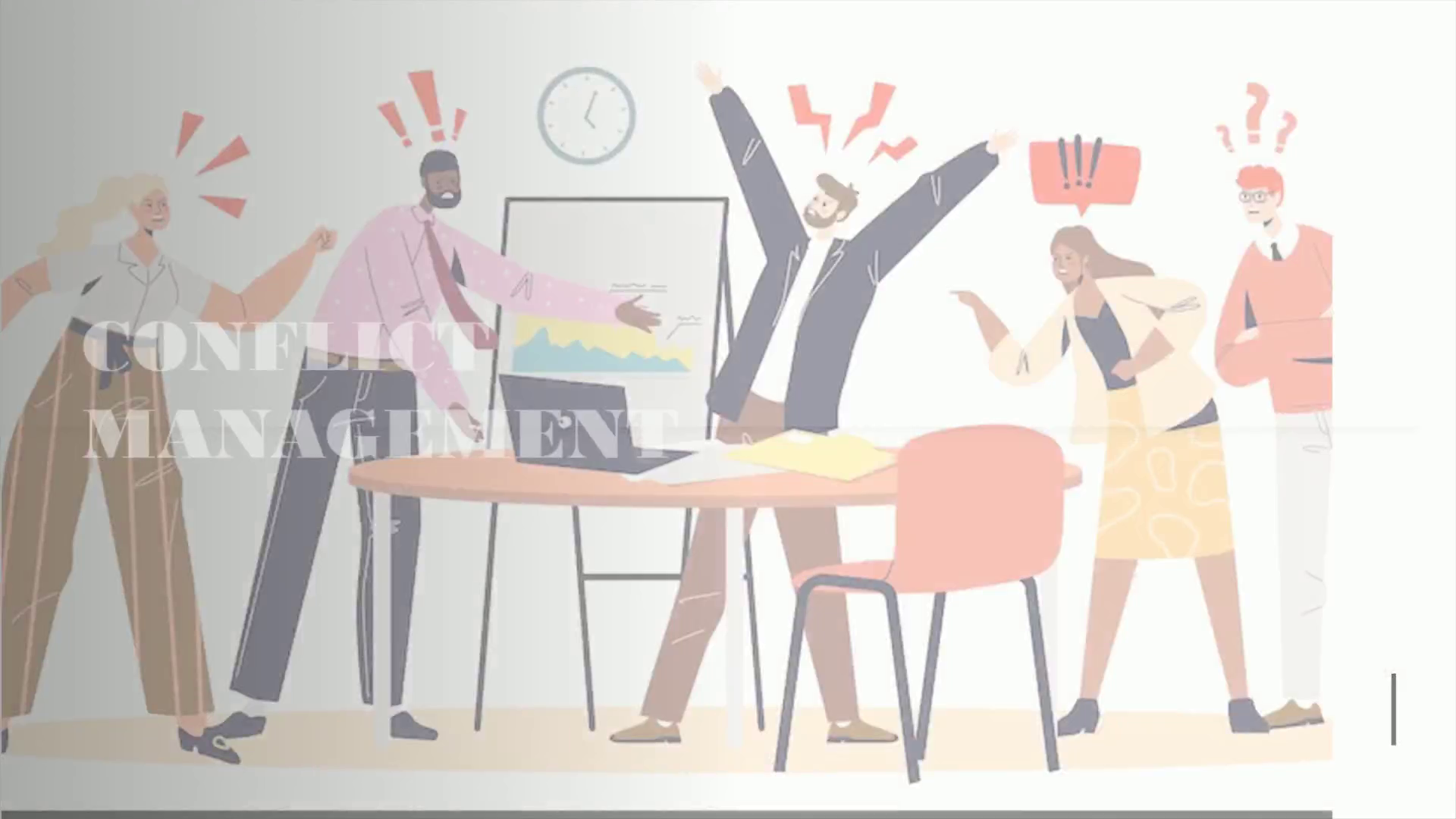Scene 1 (0s)
[Audio] Conflict Management. A group of people in clothing Description automatically generated with low confidence.
Scene 2 (9s)
[Audio] What is CONFLICT? A disagreement between people that may be the result of different Ideas Perspectives Priorities Preferences Beliefs Values Goals Organizational Structures.
Scene 3 (32s)
[Audio] Conflict is inevitable given the wide range of goals for the different stakeholders in the organization. The discord that arises when goals, interests or values of different individuals or groups are incompatible and those people block or thwart each other's efforts to achieve their objectives. Lack of Conflict signals that management: Emphasizes conformity and stifles innovation. Conflict is good for orgarnizational performance, although excessive conflict causes managers to spend too much time achieving their own ends..
Scene 4 (1m 7s)
[Audio] Conflict can cause organizational distress Low morale Complaints and bickering Minimum creativity Lack of team spirit Absenteeism and turnover..
Scene 5 (1m 24s)
[Audio] The Effect of conflict on organization performance Too little conflict causes performance to suffer Too much conflict causes performance to suffer Optimum level of conflict leads to effective decision making and high performance.
Scene 6 (1m 43s)
[Audio] Sources of Organizational Conflict can be Incompatible goals and time horizons, Overlapping Authority, Task interdependencies, Incompatible evaluation or reward systems, Scarce resources or Status inconsistencies..
Scene 7 (1m 58s)
[Audio] Looking at Sources of Conflict • Ambiguous jurisdictions: "I don't know who has the sign off on that issue." • Conflict of interest: "Doesn't she belong to the College too?" • Communication barriers: "They never return phone calls." • Unresolved prior conflicts: "We always have a problem with the Feds about the final report." • Over dependency of one party: "We will have to wait until the Budget is announced.".
Scene 8 (2m 35s)
[Audio] Misconceptions about Conflict • Harmony is "normal" • Conflict is "abnormal" • Conflicts and disagreements are the same • Conflict is the result of "personality problems" • Conflict and anger are the same.
Scene 9 (2m 55s)
[Audio] Types of Conflict Interpersonal Conflict -Conflict between individuals due to differences in their goals or values. Intragroup Conflict -Conflict within a group or team. Intergroup Conflict -Conflict between two or more teams or groups. -Managers play a key role in resolution of this conflict Interorganizational Conflict -Conflict that arises across organizations..
Scene 10 (3m 29s)
[Audio] Understanding Conflict Stage Frustration Conceptualization Behavior Outcome Individual Thought or Action Blocked from satisfying goals Determine the problem Behavior is based on beliefs The conflict is resolved in one of three ways: - win/lose, - lose/lose, - win/win.
Scene 11 (4m 5s)
[Audio] Conflict Management Constructive Conflict Growth occurs Problems are resolved Unifies a group Enhances productivity Increases commitment.
Scene 12 (4m 23s)
[Audio] Conflict Management Leads to negativism Diminished resolutions Group division Decreases productivity Lessens satisfaction Conflict Management Destructive Conflict Leads to negativism Diminished resolutions Group division Decreases productivity Lessens satisfaction.
Scene 13 (4m 55s)
[Audio] Conflict is destructive when it • Takes attention from important activities • Undermines morale or self-esteem • Polarizes people and groups • Jeopardizes teamwork • Leads to negative behavior • Creates stress.
Scene 14 (5m 17s)
[Audio] Conflict is constructive when it • Identifies and clarifies important issues • Solves problems • Results in "something for everyone" • Causes authentic communication • Leads to sharing information • Encourages cooperation • Builds/strengthens interpersonal skills.
Scene 15 (5m 44s)
[Audio] Conflict Manifestation Phase 1 Frustration Phase 2 Conceptualization of cause Phase 3 Behavior directed at cause Phase 4 Outcome as a result of the behavior.
Scene 16 (6m 8s)
[Audio] Going beyond Defensive coping Begin with communication Focus on active listening techniques Separate the problem from the person Use "I" statements.
